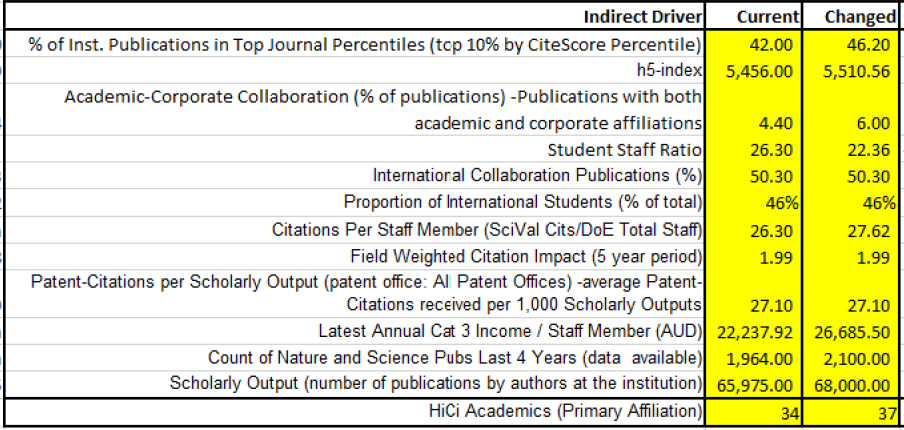Concerto Thought Leader/ Business Modelling Expert / Higher Education Strategist / Professor
There is no question that Andrew Flitman’s academic and professional history is impressive. Glancing at his achievements over the last 2 decades shows that he has a comprehensive business strategy skill set, is a highly competent mathematician (he holds a double 1st class honours degree from the University of York, in mathematics and computer science, and a statistical modelling PhD) and notably, has made significant impact at higher education institutions, through teaching, leading and consulting. To cap it off – Andrew is a down to earth, personable, and entertaining guy.
Andrew’s early career started with 4 years at Deloitte in London, where he was initiated into the world of strategic thinking by a baptism of fire. He was forced to problem solve and critically assess business processes in real-time, sparking a lifelong interest in business process improvement.
Deloitte led Andrew to Melbourne in the early ’90s, but instead, he found himself at Monash University – he discovered his calling was higher education, more specifically, ‘systems management improvement’, within higher education institutions.
Andrew was a professor at Monash University (from 1992-2004). He went from a senior lecturer to heading up the School of Business Systems. One of his notable achievements at Monash was formalising the management of quality, in all aspects of the student experience. This resulted in his School being the first ISO 9001 quality assurance accredited academic unit, in the country.
Andrew then spent 2 years (from 2005-2007) at Deakin University, as the Dean of Science of Technology. Andrew led a significant turnaround in the ongoing viability of the Faculty.
From 2007, Andrew then spent 5 years at Swinburne University, where he assumed the role of Deputy Vice-Chancellor Research. During his time at Swinburne, Andrew impressively spearheaded the international ranking status of Swinburne, 4 years ahead of target. They were previously unranked with a calculated 17% chance of getting ranked. Swinburne ended up being positioned in the top 400 during his time there.
Having experience with commercial consulting and data modelling, Andrew employed modelling approaches at Deakin and Swinburne, as a successful agent in supporting decision making. His ability to fuse data science with a human-first management approach has proved a winning skillset.
Andrew’s passion for higher education gave birth to his mission to create, with Concerto, a modelling tool for universities, that has a more flexible and nuanced approach to ranking.
A Look at the Current Global Rankings for Higher Education
The 3 prominent international ranking systems are the Academic Ranking of World Universities (ARWU), the Times Higher Education (THE) and the Quacquarelli Symonds (QS) rankings. As we’ll explore, the current ranking systems are useful but imperfect, as they place fixed debatable proportions on specific outcomes, with a very heavy emphasis on research over teaching.
In total, 17 metrics are divided across the 3 ranking schemes. Given the range of global performance data available, Andrew argues that the choice of metrics is somewhat arbitrary, as are the weightings attached to each. The metrics and weights are unlikely to match the mission and objectives of any institution. What results is a flawed and highly contested, yet necessary and widely publicised, ranking system that serves as a critical driver in a student’s university selection process.
The 3 University Ranking Schemes and Their Metrics
QS – Rank by region and subject
-
- Academic Reputation – 40%
- Employer Reputation – 10%
- Faculty/Student Ratio – 20%
- Citations per faculty – 20%
- International Faculty Ratio – 5%
- International Student Ratio – 5%
THE (The Times Higher Education) World University Rankings – judge research-intensive universities
- Teaching (the learning environment) – 30%
- Research (volume, income and reputation) – 30%
- Citations (research influence) – 30%
- International outlook (staff, students, research) – 7.5%
- Industry income (knowledge transfer) – 2.5%
ARWU (Academic Ranking of World Universities) – Assessment based on the number of alumni and staff winning Nobel Prizes, highly cited researchers, and published articles in Nature and Science journals.
- Quality of education – 10%
- Quality of Faculty – 20%
- Highly cited researchers – 20%
- Research output (nature and science papers published) – 20%
- Research output (papers indexed in science citation) – 20%
- Per capita performance – 10%
Andrew’s Critique of the Current Global Rankings
With reference to the outlined metrics above, we can see that there is a heavy emphasis placed on research, rather than on the quality of teaching (which is harder to measure). Some evident flaws are that whilst objective data is used, the weightings attached to metrics are fixed and debatable. There is also significant variance across the 3 schemes and within each scheme, the ‘one-size fits all’ model does not adequately reflect the unique priorities of individual institutions. There is, however, valuable performance information within the current ranking schemes, and as such, are published by universities as ‘proof’ of their institutional standing.
A Proposed Solution
Andrew’s goal was to make the metrics and their relative weightings less ‘arbitrary’ and more meaningful. He wanted a model that would enable a selection of inputs, across all 17 metrics, without any assumptions regarding their assigned weights. A process that would enable higher institutions to access how scenario modelling different inputs (metrics) could affect their overall ranking.
Andrew believes that institutions need to make informed strategic and tactical decisions, by testing out ‘what if’ scenarios. Andrew’s scenario modelling concept is about involving university leaders and decision-makers so that they can have an objective measure of the impact that their strategic decision may have, before they commit to implementing change.
Universities need to make sense of their ranking and the constraints that are inherent with the current ranking schemes. They need to be empowered to assess strategies and tactics (related to their costs) as they pertain to their global ranking and long-term endeavours. They also need to understand their standing, in relation to their specific mission and objectives, and how that can be impacted by proposed strategies and tactics.
iMORSE Ranking Model & Concerto Collaboration

The variables that Andrew has modelled with Concerto can be seen in the fig above. These variables are measures that all universities have available to them, and can be statistically linked to the metrics used by ARWU, THE and QS. Andrew has determined that these variables are more meaningful for university leaders (in terms of the impact of their strategic decisions) than the ranking metrics. He suggests that these inputs can be facilitated through internal workshops, where leaders can decide on the most important input variables and discuss how these metrics may be impacted by proposed tactics and strategies.
Concerto modelling takes this complex information and makes it accessible for everyone. Scenario modelling is an effective tool to aid decision making that can directly impact a university’s global ranking.
Users are also able to input the standard ranking metrics, based on the 3 ranking schemes. The model provides wide-ranging flexibility, giving the user the ability to select and deselect specific inputs and the manual setting of weights.

Above: Illustrative example is based on the University of Melbourne.
To Conclude
“Managing an institution needs more than just ‘genius’” – Andrew Flitman
It is from hands-on experience in propelling universities global ranking status, that has guided Andrew’s determination to build a better ranking model. For models to be effective decision-support tools, they must be used in conjunction with talking to managers and decision-makers directly. Effective management is both a science and art.
By combining his expertise of strategic consultancy, and passion for higher education, Andrew is without a doubt, paving the way for a truly transformative approach to how universities will be aided in strategic decision making, and ranked globally in the future.
Today, Andrew runs his strategic analytics consultancy company iMorse (launched in 2012), with one core area of exploration looking at how to diversify higher education. Andrew was made Honorary Professor at Melbourne University in 2012 and Torrens University in 2020. Andrew acts as an ongoing Subject Matter Expert to PwC. As of 2020, Andrew partnered with Wells Associates, to provide strategic advice to the higher education sector. He is also a Fellow of the Australian Operational Research Society and Computer Society.

